第十八课,由obwohl引导的让步从句
初中英语知识点归纳让步状语从句的引导词和结构

初中英语知识点归纳让步状语从句的引导词和结构引导词:1. Although (尽管)2. Even though (即使)3. Though (虽然)4. Despite (尽管)5. In spite of (尽管)结构:让步状语从句在句子中起到让步、转折的作用,常常出现在主句之前或之后。
1. Although/Even though/Though + 从句, + 主句例如:Although it was raining, we still went for a walk.尽管下雨,我们还是去散了个步。
2. 主句 + although/though + 从句例如:He failed the exam, although he studied hard.虽然他学习很努力,但还是考砸了。
3. Despite/In spite of + 名词/动名词/代词, + 从句例如:Despite the heavy rain, they managed to finish the race.尽管下着大雨,他们还是成功完成了比赛。
4. 从句 + despite/in spite of + 名词/动名词/代词例如:She passed the test, despite the fact that she didn't study much.尽管她没怎么学习,她还是通过了考试。
5. In spite of the fact that + 从句, + 主句例如:In spite of the fact that she was tired, she continued working.尽管她很累,她还是继续工作。
6. Though + 倒装句例如:Though tired they were, they still kept going.尽管他们很疲惫,他们还是坚持下去。
7. However + adj/adv, + 句子例如:However difficult the task is, we will do our best.无论任务多么困难,我们会尽力而为。
初中英语知识点归纳让步状语从句的引导词与用法
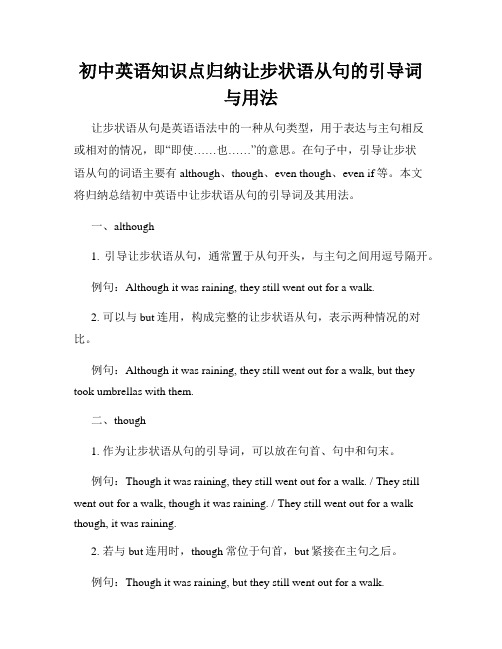
初中英语知识点归纳让步状语从句的引导词与用法让步状语从句是英语语法中的一种从句类型,用于表达与主句相反或相对的情况,即“即使……也……”的意思。
在句子中,引导让步状语从句的词语主要有although、though、even though、even if等。
本文将归纳总结初中英语中让步状语从句的引导词及其用法。
一、although1. 引导让步状语从句,通常置于从句开头,与主句之间用逗号隔开。
例句:Although it was raining, they still went out for a walk.2. 可以与but连用,构成完整的让步状语从句,表示两种情况的对比。
例句:Although it was raining, they still went out for a walk, but they took umbrellas with them.二、though1. 作为让步状语从句的引导词,可以放在句首、句中和句末。
例句:Though it was raining, they still went out for a walk. / They still went out for a walk, though it was raining. / They still went out for a walk though, it was raining.2. 若与but连用时,though常位于句首,but紧接在主句之后。
例句:Though it was raining, but they still went out for a walk.三、even though1. 引导让步状语从句,与although具有相同的意思,但更强调让步的程度。
例句:Even though it was raining heavily, they still went out for a walk.2. 可以将even though拆分,even放在句首,though放在句中,但两者之间需用逗号隔开。
让步状语从句
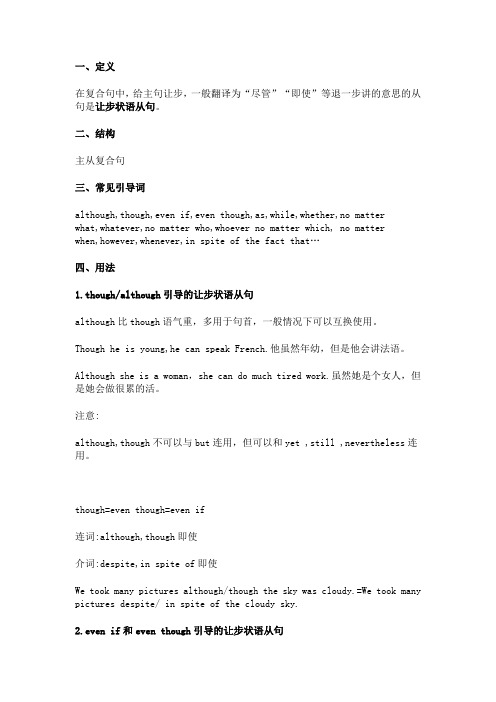
一、定义在复合句中,给主句让步,一般翻译为“尽管”“即使”等退一步讲的意思的从句是让步状语从句。
二、结构主从复合句三、常见引导词although,though,even if,even though,as,while,whether,no matterwhat,whatever,no matter who,whoever no matter which, no matter when,however,whenever,in spite of the fact that…四、用法1.though/although引导的让步状语从句although比though语气重,多用于句首,一般情况下可以互换使用。
Though he is young,he can speak French.他虽然年幼,但是他会讲法语。
Although she is a woman,she can do much tired work.虽然她是个女人,但是她会做很累的活。
注意:although,though不可以与but连用,但可以和yet ,still ,nevertheless连用。
though=even though=even if连词:although,though即使介词:despite,in spite of即使We took many pictures although/though the sky was cloudy.=We took many pictures despite/ in spite of the cloudy sky.2.even if和even though引导的让步状语从句Even if/though I am a woman,I will work like a man.即使我是个女人,我也会像男人一样去工作。
3.as和though引导的倒装式让步状语从句as必须用倒装结构,though可用也可不用倒装结构。
0842 第二外语(德语)
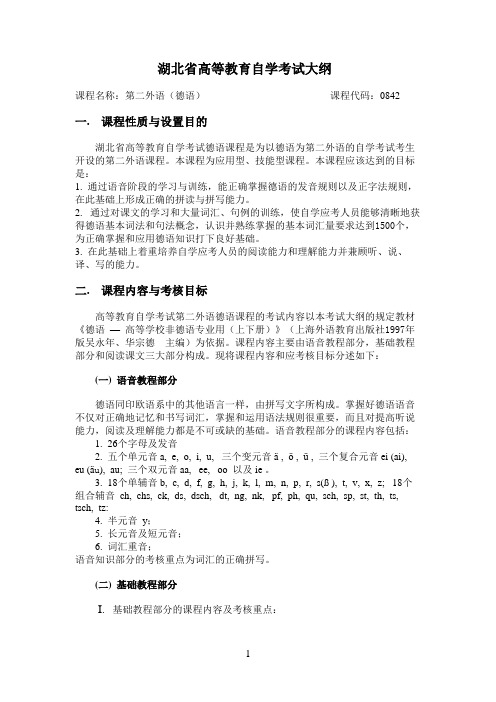
湖北省高等教育自学考试大纲课程名称:第二外语(德语)课程代码:0842一. 课程性质与设置目的湖北省高等教育自学考试德语课程是为以德语为第二外语的自学考试考生开设的第二外语课程。
本课程为应用型、技能型课程。
本课程应该达到的目标是:1. 通过语音阶段的学习与训练,能正确掌握德语的发音规则以及正字法规则,在此基础上形成正确的拼读与拼写能力。
2. 通过对课文的学习和大量词汇、句例的训练,使自学应考人员能够清晰地获得德语基本词法和句法概念,认识并熟练掌握的基本词汇量要求达到1500个,为正确掌握和应用德语知识打下良好基础。
3. 在此基础上着重培养自学应考人员的阅读能力和理解能力并兼顾听、说、译、写的能力。
二. 课程内容与考核目标高等教育自学考试第二外语德语课程的考试内容以本考试大纲的规定教材《德语—高等学校非德语专业用(上下册)》(上海外语教育出版社1997年版吴永年、华宗德主编)为依据。
课程内容主要由语音教程部分,基础教程部分和阅读课文三大部分构成。
现将课程内容和应考核目标分述如下:(一) 语音教程部分德语同印欧语系中的其他语言一样,由拼写文字所构成。
掌握好德语语音不仅对正确地记忆和书写词汇,掌握和运用语法规则很重要,而且对提高听说能力,阅读及理解能力都是不可或缺的基础。
语音教程部分的课程内容包括:1. 26个字母及发音2. 五个单元音 a, e, o, i, u, 三个变元音 ä , ö , ü , 三个复合元音 ei (ai), eu (äu), au; 三个双元音 aa, ee, oo 以及 ie 。
3. 18个单辅音 b, c, d, f, g, h, j, k, l, m, n, p, r, s(ß ), t, v, x, z; 18个组合辅音 ch, chs, ck, ds, dsch, dt, ng, nk, pf, ph, qu, sch, sp, st, th, ts, tsch, tz:4. 半元音 y;5. 长元音及短元音;6. 词汇重音;语音知识部分的考核重点为词汇的正确拼写。
让步状语从句通俗易懂理解
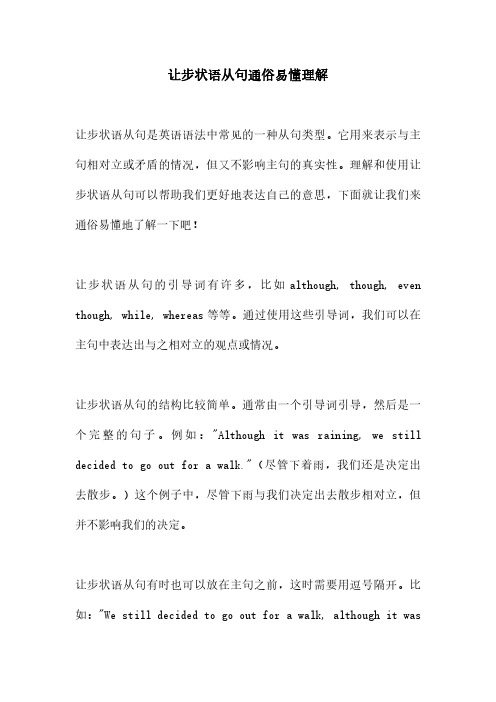
让步状语从句通俗易懂理解让步状语从句是英语语法中常见的一种从句类型。
它用来表示与主句相对立或矛盾的情况,但又不影响主句的真实性。
理解和使用让步状语从句可以帮助我们更好地表达自己的意思,下面就让我们来通俗易懂地了解一下吧!让步状语从句的引导词有许多,比如although,though,even though,while,whereas等等。
通过使用这些引导词,我们可以在主句中表达出与之相对立的观点或情况。
让步状语从句的结构比较简单。
通常由一个引导词引导,然后是一个完整的句子。
例如:"Although it was raining,we still decided to go out for a walk."(尽管下着雨,我们还是决定出去散步。
)这个例子中,尽管下雨与我们决定出去散步相对立,但并不影响我们的决定。
让步状语从句有时也可以放在主句之前,这时需要用逗号隔开。
比如:"We still decided to go out for a walk,although it wasraining."(虽然下着雨,我们还是决定出去散步。
)这个例子中,主句与让步状语从句的顺序发生了变化,但意思并没有改变。
让步状语从句的使用可以使我们的语言更加丰富多样。
它可以帮助我们表达自己的意愿、观点或决定,同时也能够展示出我们对事物的全面思考。
通过使用让步状语从句,我们可以在表达自己的观点时更加灵活,同时也能够更加准确地传达我们的意思。
然而,我们在使用让步状语从句时需要注意一些细节。
首先,我们需要确保让步状语从句与主句之间的逻辑关系清晰明确,以免造成混淆。
其次,我们需要注意让步状语从句的位置和标点符号的运用,以确保句子结构的完整和语义的准确。
总之,让步状语从句是英语语法中的一种重要句子结构。
通过理解和灵活运用让步状语从句,我们可以更好地表达自己的意思,使我们的语言更加生动有趣,同时也能够更加准确地传达我们的观点和决定。
让步状语引导词

让步状语引导词
让步状语从句是复合句中的一种,它表示一种假设的、相反的情况或前提。
在英语中,常用的让步状语引导词有:although, though, even if, even though, while, whereas等。
1. Although和though都表示“尽管”,语气比but稍弱,可以和yet连用。
例如:Although it was raining, he went out.(尽管下雨了,他还是出去了。
)
2. Even if和even though都表示“即使”,后面的句子要用虚拟语气。
例如:Even if/though he is poor, he is happy.(即使他很穷,但他很快乐。
)
3. While和whereas都表示“然而”,用于对比两个相对的事物。
例如:While I like tea, my sister likes coffee.(我喜欢茶,但我妹妹喜欢咖啡。
)Whereas Tom is tall, his brother is short.(汤姆很高,但他弟弟很矮。
)
4. 另外还有一些其他的让步状语引导词,如granted that, granted that 等。
它们的语气比although和though更委婉一些。
例如:Granted that he is rich, he is not happy.(尽管他很富有,但他并不快乐。
)。
2020上海外国语大学德语考研备考语法知识点复习·从句
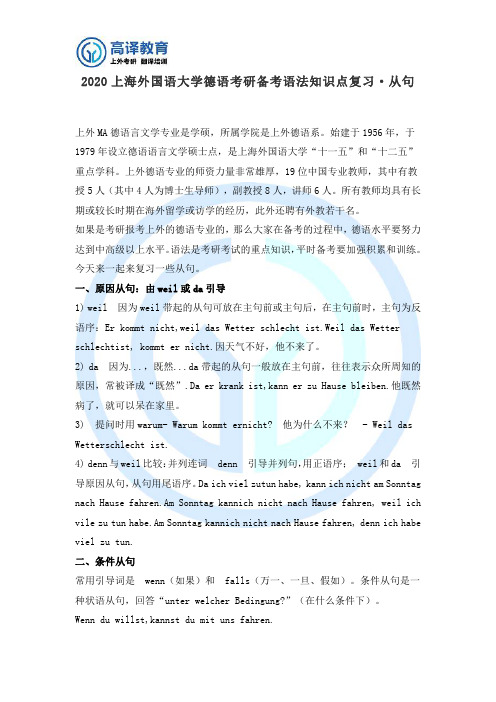
2020上海外国语大学德语考研备考语法知识点复习·从句上外MA德语言文学专业是学硕,所属学院是上外德语系。
始建于1956年,于1979年设立德语语言文学硕士点,是上海外国语大学“十一五”和“十二五”重点学科。
上外德语专业的师资力量非常雄厚,19位中国专业教师,其中有教授5人(其中4人为博士生导师),副教授8人,讲师6人。
所有教师均具有长期或较长时期在海外留学或访学的经历,此外还聘有外教若干名。
如果是考研报考上外的德语专业的,那么大家在备考的过程中,德语水平要努力达到中高级以上水平。
语法是考研考试的重点知识,平时备考要加强积累和训练。
今天来一起来复习一些从句。
一、原因从句:由weil或da引导1)weil因为weil带起的从句可放在主句前或主句后,在主句前时,主句为反语序:Er kommt nicht,weil das Wetter schlecht ist.Weil das Wetter schlechtist,kommt er nicht.因天气不好,他不来了。
2)da因为...,既然...da带起的从句一般放在主句前,往往表示众所周知的原因,常被译成“既然”.Da er krank ist,kann er zu Hause bleiben.他既然病了,就可以呆在家里。
3)提问时用warum-Warum kommt ernicht?他为什么不来?-Weil das Wetterschlecht ist.4)denn与weil比较:并列连词denn引导并列句,用正语序;weil和da引导原因从句,从句用尾语序。
Da ich viel zutun habe,kann ich nicht am Sonntag nach Hause fahren.Am Sonntag kannich nicht nach Hause fahren,weil ich vile zu tun habe.Am Sonntag kannich nicht nach Hause fahren,denn ich habe viel zu tun.二、条件从句常用引导词是wenn(如果)和falls(万一、一旦、假如)。
第十八课,由obwohl引导的让步从句

Nebensatz 从句 obwohl ich keine Zeit habe.
Herr Liu kann gut Deutsch sprechen, obwohl es sehr schwer ist. 尽管德语很难,但是刘先生德语说得很好。
Er ist nicht mitgekommen,
obwohl ich ihn mehrmals eingeladen habe.
für seine Familie. 4. Es regnet. Hans geht noch spazieren. 5. Er ist schon 60 Jahre alt. Er ist auf den Himalaja gestiegen. 6. Sie arbeitet sehr viel. Sie verdient sehr wenig. 7. Er hat nicht viel Geld. Er hat sich einen Mercedes gekauft.
2. 用副词trotzdem用作并列连词,表示trotzdem句子所述的内容不受 前一句所述内容的影响仍然实现
Ich habe keine Zeit. Trotzdem habe ich eine Verabredung mit ihr. 尽管我没有时间,但是我还和她约会。zdem kann Herr Liu es gut sprechen. 尽管德语很难,但是刘先生德语说得很好。 Ich habe ihn mehrmals eingeladen. Trotzdem ist er nicht mitgekommen. 尽管我多次邀请他,但是他还是没有一起去。
尽管我多次邀请他,但是他还是没有一起去。
Nebensatz 从句 obwohl ich keine Zeit habe, obwohl Deutsch sehr schwer ist, obwohl ich ihn mehrmals eingeladen habe,
让步从句 完结

让步从句一、让步并列复合句 ---- 简单句1. zwar(占位)....aber... 虽然...但是Zwar ist er krank, aber er kommt noch .Er ist zwar krank, er kommt aber noch.2. jedoch dennoch doch 转折,一般占位Zwar ist er krank, dennoch kommt er noch.3. allerdings 不过,占位,位于句首allein |雅体| 只是,位于句首,不占位Ich kann mitgehen, allerdings möchte ich eine Bedingung stellen.eine Bedingung stellen 提出条件eine Frage stellenIch kann mitgehen, allein ich kann dort nicht lange bleiben.4. auch 就算,非独立成分Auch die klügsten Schüler können diese Frage nicht beantworten.Auch QQ kann er sich nicht leisten.Auch mit dir kann ich das nicht rechtzeitig schaffen.Auch morgen kann ich nicht ankommen.5. trotzdem adv 尽管如此Er ist krank, trotzdem kommt er noch.Er ist krank, er kommt trotzdem noch.er kommt noch trotzdem.二、让步从句1. trotzdem conj 尽管(较少使用)Trotzdem er krank ist, kommt er noch.--Er kommt noch, trotzdem er krank ist.--Er ist krank, trotzdem kommt er noch.2. obwohl conj 尽管(口)obgleich obzwar obschon wenngleich 书面语·Obwohl er krank ist, kommt er noch.·Er gibt nicht zu, obzwar alle wissen, dass er daran schuld war.zu/geben an ... schuld sein在某事上有错...haben mit D kaum/ nichts/ etw. zu tun 与...无(有)关3. auch wenn = obwohl = selbst wenn 尽管wenn ... auch·(Auch wenn alle wissen, dass er daran schuld war), gibt er nicht zu. ·(Wenn alle auch wissen, dass er daran schuld war,) er gibt nicht zu.句子不占位wenn...auch..., so......doch....--Wenn alle auch wissen, dass....., (so) gibt er doch nicht zu.·Er gibt nicht zu, wenn alle auch wissen .......auch wenn alle wissen...·Auch wenn er sehr vorsichtig war, hat er noch Fehler gemacht.--Wenn er auch sehr vorsichtig war, er hat noch Fehler gemacht.--Wenn er auch sehr vorsichtig war, (so) hat er doch noch Fehler gemacht.sehr vorsichtig sein Fehler machen 4. auch wenn 即使·Auch wenn du sehr fleißig bist, kannst du die P nicht bestehen.三、疑问词1....... auch/ immer无论,不管小品词的位置带auch的从句,除了auch wenn占位,其它都不占Wie das Wetter auch immer ist, ich gehe zu dir.Wann du auch kommst, du bist bei uns willkommen.Wo du auch bist, ich kann dich finden.Woran du auch immer denkst, ich weiß das.Wie schwer Deutsch auch ist, ich kann das erlernen.Auf wen du auch wartest, es ist mir egal.2. ob + auch无论是否,不管是否Ob du damit auch einverstanden bist, ich muss es tun.Ob es auch regnet, wir müssen jetzt losgehen.so + adj /adv ...... auch 就算再...So schlau der Täter auch ist, er wurde verhaftet. 就算这个罪犯再狡猾,…wie adj/adv...auch... 无论多...Wie schlau der Täter auch ist, ... ...·So gelassen(冷静,淡定) du auch aussiehst, du kannst deine innere Angst nicht verstecken. Glassenheit 从容,冷静四、介词结构分词结构1. abgesehen davon, .... 不管(+ dass, ob, w-)·Ich werde dich unterstützen, abgesehen davon, dass du mich einmal geschlagen hast.·Ich werde dich unterstützen, abgesehen davon, ob du gewinnst.·Ich werde dich unterstützen, abgesehen davon, wann du zu mir zurückkommst.2. ungeachtet dessen, ..... 不管,不顾unabhängig davon, ....·Er ist abhängig(依赖) von seiner Freundin.·Ich werde dich finden, unabhängig davon, wo du dich versteckst.3. trotz G·Trotz der Krankheit hat er rechtzeitig alle Probleme erledigt.--Obwohl er krank war, hat er rechtzeitig alle Probleme erledigt.4. ungeachtet G 不管achten Achtung!·Ungeachtet meiner Vorschläge ging er einfach weg.。
深入了解德语语法复杂句子结构分析
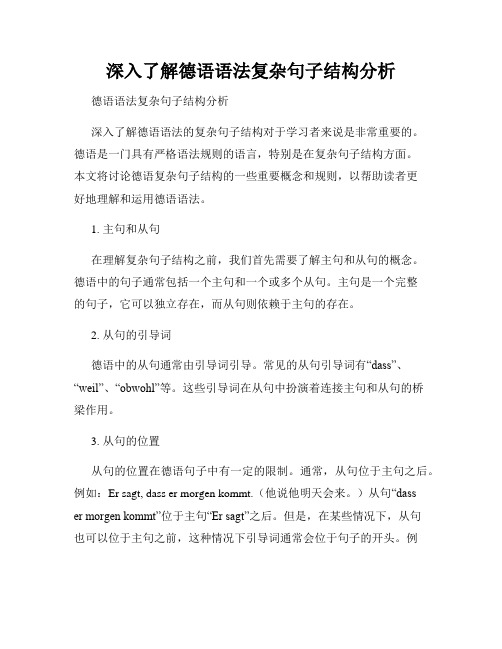
深入了解德语语法复杂句子结构分析德语语法复杂句子结构分析深入了解德语语法的复杂句子结构对于学习者来说是非常重要的。
德语是一门具有严格语法规则的语言,特别是在复杂句子结构方面。
本文将讨论德语复杂句子结构的一些重要概念和规则,以帮助读者更好地理解和运用德语语法。
1. 主句和从句在理解复杂句子结构之前,我们首先需要了解主句和从句的概念。
德语中的句子通常包括一个主句和一个或多个从句。
主句是一个完整的句子,它可以独立存在,而从句则依赖于主句的存在。
2. 从句的引导词德语中的从句通常由引导词引导。
常见的从句引导词有“dass”、“weil”、“obwohl”等。
这些引导词在从句中扮演着连接主句和从句的桥梁作用。
3. 从句的位置从句的位置在德语句子中有一定的限制。
通常,从句位于主句之后。
例如:Er sagt, dass er morgen kommt.(他说他明天会来。
)从句“dasser morgen kommt”位于主句“Er sagt”之后。
但是,在某些情况下,从句也可以位于主句之前,这种情况下引导词通常会位于句子的开头。
例如:Obwohl er krank ist, geht er zur Arbeit.(尽管他生病了,他还是去上班。
)4. 从句的语序德语中的从句语序相对灵活,但有一些基本规则需要遵守。
在从句中,动词通常位于句首,然后是主语和其他成分。
例如:Er sagt, dass er morgen kommt.(他说他明天会来。
)在从句“er morgen kommt”中,动词“kommt”位于句首,然后是主语“er”。
5. 从句的语法现象在德语复杂句子中,从句还涉及一些特殊的语法现象,如虚拟语气和倒装等。
例如:Wenn ich reich wäre, würde ich ein Haus kaufen.(如果我有钱,我就会买房子。
)这个句子中的从句“wenn ich reich wäre”使用了虚拟语气,表示与事实相反的情况。
让步状语从句简说
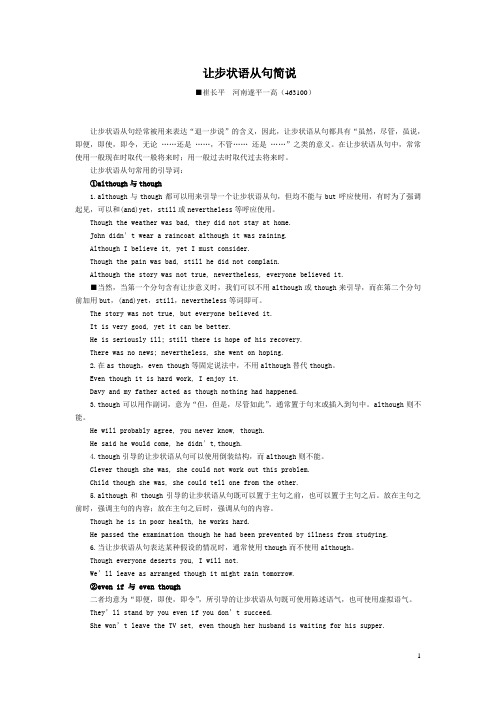
让步状语从句简说■崔长平河南遂平一高(463100)让步状语从句经常被用来表达“退一步说”的含义,因此,让步状语从句都具有“虽然,尽管,虽说,即便,即使,即令,无论……还是……,不管……还是……”之类的意义。
在让步状语从句中,常常使用一般现在时取代一般将来时;用一般过去时取代过去将来时。
让步状语从句常用的引导词:①although与though1.although与though都可以用来引导一个让步状语从句,但均不能与but呼应使用,有时为了强调起见,可以和(and)yet,still或nevertheless等呼应使用。
Though the weather was bad, they did not stay at home.John didn′t wear a raincoat although it was raining.Although I believe it, yet I must consider.Though the pain was bad, still he did not complain.Although the story was not true, nevertheless, everyone believed it.■当然,当第一个分句含有让步意义时,我们可以不用although或though来引导,而在第二个分句前加用but,(and)yet,still,nevertheless等词即可。
The story was not true, but everyone believed it.It is very good, yet it can be better.He is seriously ill; still there is hope of his recovery.There was no news; nevertheless, she went on hoping.2.在as though,even though等固定说法中,不用although替代though。
德语专业四级考试(PGG)2022年模拟题三
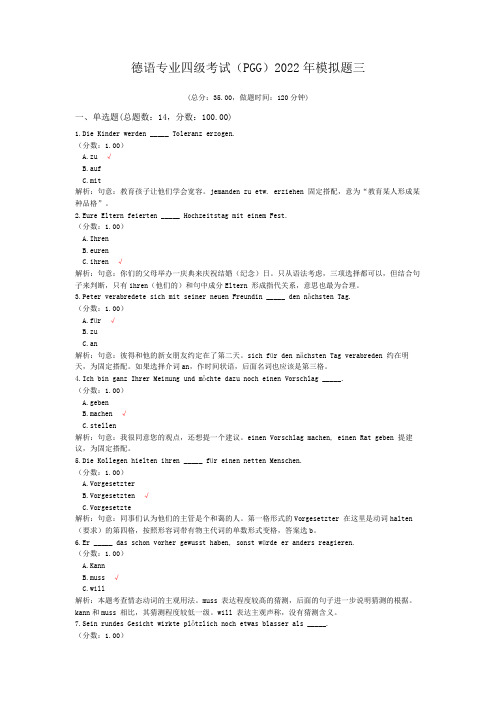
德语专业四级考试(PGG)2022年模拟题三(总分:35.00,做题时间:120分钟)一、单选题(总题数:14,分数:100.00)1.Die Kinder werden _____ Toleranz erzogen.(分数:1.00)A.zu √B.aufC.mit解析:句意:教育孩子让他们学会宽容。
jemanden zu etw. erziehen 固定搭配,意为“教育某人形成某种品格”。
2.Eure Eltern feierten _____ Hochzeitstag mit einem Fest.(分数:1.00)A.IhrenB.eurenC.ihren √解析:句意:你们的父母举办一庆典来庆祝结婚(纪念)日。
只从语法考虑,三项选择都可以,但结合句子来判断,只有ihren(他们的)和句中成分Eltern 形成指代关系,意思也最为合理。
3.Peter verabredete sich mit seiner neuen Freundin _____ den nächsten Tag.(分数:1.00)A.für√B.zuC.an解析:句意:彼得和他的新女朋友约定在了第二天。
sich für den nächsten Tag verabreden 约在明天,为固定搭配。
如果选择介词an,作时间状语,后面名词也应该是第三格。
4.Ich bin ganz Ihrer Meinung und möchte dazu noch einen Vorschlag _____.(分数:1.00)A.gebenB.machen √C.stellen解析:句意:我很同意您的观点,还想提一个建议。
einen Vorschlag machen, einen Rat geben 提建议,为固定搭配。
5.Die Kollegen hielten ihren _____ für einen netten Menschen.(分数:1.00)A.VorgesetzterB.Vorgesetzten √C.Vorgesetzte解析:句意:同事们认为他们的主管是个和蔼的人。
让步状语从句的表达方式初中语法技巧
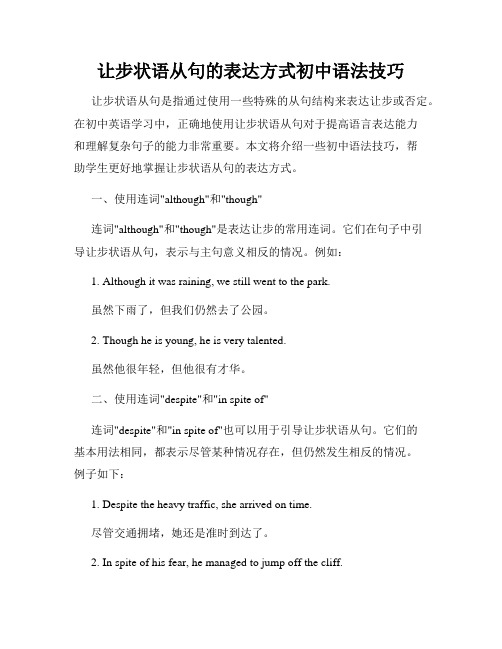
让步状语从句的表达方式初中语法技巧让步状语从句是指通过使用一些特殊的从句结构来表达让步或否定。
在初中英语学习中,正确地使用让步状语从句对于提高语言表达能力和理解复杂句子的能力非常重要。
本文将介绍一些初中语法技巧,帮助学生更好地掌握让步状语从句的表达方式。
一、使用连词"although"和"though"连词"although"和"though"是表达让步的常用连词。
它们在句子中引导让步状语从句,表示与主句意义相反的情况。
例如:1. Although it was raining, we still went to the park.虽然下雨了,但我们仍然去了公园。
2. Though he is young, he is very talented.虽然他很年轻,但他很有才华。
二、使用连词"despite"和"in spite of"连词"despite"和"in spite of"也可以用于引导让步状语从句。
它们的基本用法相同,都表示尽管某种情况存在,但仍然发生相反的情况。
例子如下:1. Despite the heavy traffic, she arrived on time.尽管交通拥堵,她还是准时到达了。
2. In spite of his fear, he managed to jump off the cliff.尽管他害怕,他还是成功地跳下了悬崖。
三、使用连词"while"和"whereas"连词"while"和"whereas"在句子中同样可以引导让步状语从句,表示相对的情况。
两者的基本用法相同,但"whereas"通常用于对比两个相对矛盾的事物。
whatever引导的让步状语从句
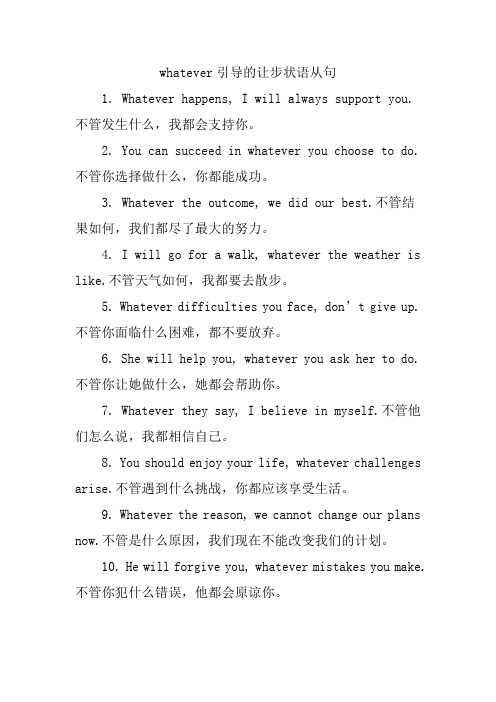
whatever引导的让步状语从句
1. Whatever happens, I will always support you.不管发生什么,我都会支持你。
2. You can succeed in whatever you choose to do.不管你选择做什么,你都能成功。
3. Whatever the outcome, we did our best.不管结果如何,我们都尽了最大的努力。
4. I will go for a walk, whatever the weather is like.不管天气如何,我都要去散步。
5. Whatever difficulties you face, don’t give up.不管你面临什么困难,都不要放弃。
6. She will help you, whatever you ask her to do.不管你让她做什么,她都会帮助你。
7. Whatever they say, I believe in myself.不管他们怎么说,我都相信自己。
8. You should enjoy your life, whatever challenges arise.不管遇到什么挑战,你都应该享受生活。
9. Whatever the reason, we cannot change our plans now.不管是什么原因,我们现在不能改变我们的计划。
10. He will forgive you, whatever mistakes you make.不管你犯什么错误,他都会原谅你。
whether or引导让步状语从句例句

whether or引导让步状语从句例句1. Whether or not it rains, we will still have our picnic.2. Whether or not she likes it, she has to attend the meeting.3. Whether or not he agrees, I will go on my own.4. Whether or not they believe me, I will tell the truth.5. Whether or not she apologizes, I will forgive her.6. Whether or not it snows, I will still go skiing.7. Whether or not he volunteers, I will still donate tothe charity.8. Whether or not he likes spicy food, I will still cook it.9. Whether or not they approve, I will pursue my dreams.10. Whether or not it is expensive, I will buy that dress.11. Whether or not he is qualified, I will offer him a job.12. Whether or not it is convenient, I will visit my friend.13. Whether or not she has time, I will ask her for help.14. Whether or not he is ready, I will start the presentation.15. Whether or not they believe in ghosts, I will share my supernatural experience.16. Whether or not it's crowded, I will go to the beach.17. Whether or not she agrees, I will express my opinion.18. Whether or not he remembers, I will remind him of our plans.19. Whether or not they win, I am proud of their efforts.20. Whether or not it's cold, I will go for a run.21. Whether or not she calls, I will be here for her.22. Whether or not he speaks English, I will try to communicate with him.23. Whether or not it's difficult, I will learn how to play the guitar.24. Whether or not they are available, I will try to booka table at that restaurant.25. Whether or not it's late, I will stay up to finish my work.26. Whether or not she understands, I will try to explain it again.27. Whether or not he likes surprises, I will throw him a birthday party.28. Whether or not it's dangerous, I will go on that thrilling roller coaster.29. Whether or not they think it's necessary, I will takea self-defense class.30. Whether or not it's sunny, I will wear sunscreen to protect my skin.31. Whether or not she believes in luck, I will carry my lucky charm.32. Whether or not he agrees with my choices, I will follow my own path.33. Whether or not it's a long journey, I will travel to see my family.34. Whether or not they support my decision, I will pursue my passion.35. Whether or not it's a challenging task, I will give it my best shot.36. Whether or not she accepts my apology, I will still regret my actions.37. Whether or not he trusts me, I will prove myself worthy.38. Whether or not it's well received, I will present my innovative idea.39. Whether or not they've forgotten, I will always remember our special moments.40. Whether or not it's financially rewarding, I will pursue my artistic career.41. Whether or not she agrees, I will take the risk for a chance at success.42. Whether or not he understands my perspective, I will try to bridge the gap.43. Whether or not it's safe, I will explore that hidden cave.44. Whether or not they appreciate it, I will always show kindness.45. Whether or not it's crowded, I will take the bus to work.46. Whether or not she likes surprises, I will plan a surprise party for her.47. Whether or not he wins the race, I will be proud of his efforts.48. Whether or not it's challenging, I will complete this puzzle.49. Whether or not they accept my invitation, I willstill extend it.50. Whether or not it's interesting, I will read that book.51. Whether or not she agrees with my opinion, I will respect her perspective.。
whatever however引导让步状语从句

whatever however引导让步状语从句以下是一篇3000-6000字长的文章,回答关于“[whatever however引导让步状语从句]”的问题。
引子:无论我们面对什么样的困难和挑战,无论情况如何复杂,[whatever however 引导让步状语从句]均能给予我们宝贵的启示和策略。
让我们在接下来的篇幅中,一步一步地探讨这些引导词在英语语法中的用法和相关例句。
希望通过这篇文章的阅读,您能够更加熟悉和掌握这些词语的运用,从而提升自己的英语表达能力。
第一节:介绍whatever引导的让步状语从句1.1 概述whatever是一个引导词,用来引导让步状语从句。
它的意思是“无论什么”,常用于表示无论情况如何复杂或无论选择如何,仍然坚持某种态度或行为。
1.2 用法whatever通常与be动词、动词原形、名词或形容词连用,构成whatever从句。
它可以在主语、谓语、宾语等句子成分中出现。
例如:- Whatever happens, I will always support you.(无论发生什么,我都会始终支持你。
)- I will do whatever it takes to achieve my goals.(我会竭尽全力去实现我的目标。
)- He can eat whatever he wants.(他可以吃他想吃的任何东西。
)1.3 注意事项在让步状语从句中,whatever可以与动词“do”连用,表示“做任何事情”。
例如:- Whatever you do, don't give up.(无论你做什么,都不要放弃。
)第二节:介绍however引导的让步状语从句2.1 概述however是另一个常用的引导词,用来引导让步状语从句。
它的意思是“无论如何”或“然而”,常用于表达一种对比、转折或相反的关系。
2.2 用法however通常位于主句和让步状语从句之间,用逗号与主句隔开。
引导让步状语从句的连词

引导让步状语从句的连词主要有以下这些:though, although, as; even if, even though; whether...or...; no matter+疑问词,疑问词-ever。
用法:(1)though, although表示“虽然,纵然”之意。
这两个连词意思大致相同,在一般情况下可以互换使用。
在口语中,though较常使用,altho ugh比though正式,二者都可与yet, still或never,the less连用,但不能与but连用。
例如:Although/Though he was worn out, (still) he kept on working. 虽然他已经精疲力竭了,但仍然继续工作。
Although/Though he is very old, (yet) he is quite strong. 他虽然年纪大了,身体还很健壮。
值得注意的是,although引导的让步状语从句位于主句之前的情况较多,though引导的让步状语从句可位于主句之前或主句之后。
例如:She passed the examination though she had not studied very hard. 她虽然不用功学习,考试却及格了。
(2)as, though表示“虽然……但是”,“纵使……”之意。
as引导的让步状语从句必须以部分倒装的形式出现,被倒装的部分可以是表语、状语或动词原形,though也可用于这样的结构中,但although不可以这样用。
例如:Object as yo u may, I’ll go.(=Though/Although you may object, I’ll go.) 纵使你反对,我也要去。
Hard as/ though he works, he makes little progress. (=Though he works hard, he m akes little progress.)尽管他学习很努力,但几乎没取得什么进步。
由obwohl, obgleich, wenn...auch, auch wenn带起的让步状语从句
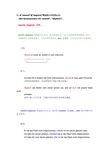
1) 由“obwohl”或“obgleich”带起的让步状语从句:(Der Konzessivsatz mit "obwohl", "obgleich")obwohl, obgleich: 尽管...obwohl (obgleich) 带起的让步从句,表示虽然发生了与主句内容相矛盾的情况,但主句谓语的行为还是实现了。
主句中常用相关词doch 来强调。
让步从句可在主句前或后。
句型:Obwohl er krank ist, kommt er zum Unterricht.___________________ _____|___________________|例子:Ich kann ihn in diesem Fall nicht unterstuertzen, obwohl er mein guter Freund ist.尽管他是我的朋友,在这种情况下我也不能支持他。
Obgleich das Wetter nicht immer schoen war, sind wir doch mit unserer Reise rechtzufrieden.虽然一路上天气不好,可我们对此次旅行还是相当满意。
obwohl (obgleich) 带起的让步从句,同由带trotzdem 或zwar ... aber 的并列复合句意义相同。
例如:Er hat das Paket nicht mitgenommen, obwohl ich ihn darum gebeten habe.Ich habe ihn darum gebeten, trotzdem hat er das Paket nicht mitgenommen.Ich habe ihn zwar darum gebeten, aber er hat das Paket nicht mitgenommen.尽管我请求他帮忙,但他还是没有把包裹带来。
be动词在让步状语从句中的用法

be动词在让步状语从句中的用法在英语语法中,让步状语从句是用来表示与主句相反或相对立的条件。
让步状语从句通常由"although/though"、"despite/in spite of"或者"even though"引导。
而be动词在让步状语从句中起着重要的作用。
在让步状语从句中,be动词的用法有以下几种情况:1. 用于表达事实的让步让步状语从句中的be动词用于陈述一个已知的事实,表示尽管事实如此,但主句中的情况仍然存在。
例如:- Although it is raining, we will still go for a walk.尽管天在下雨,我们仍然会去散步。
- Even though she is tired, she keeps working.尽管她很累,但她继续工作。
2. 用于表示假设的让步be动词也可以用于表示假设的让步,表明主句中的情况与实际情况相反。
例如:- Even if you were rich, you couldn't buy happiness.即使你很富有,也不能买到幸福。
- Though he were here, he wouldn't be able to help.纵使他在这里,他也无法帮忙。
3. 用于强调让步有时,be动词在让步状语从句中的使用是为了强调让步的重要性。
例如:- Though small he be, he is very strong.尽管他很小,但他很强壮。
- However difficult it may be, we must find a solution.不管有多困难,我们必须找到一个解决办法。
需要注意的是,be动词在让步状语从句中的使用并不局限于单数第三人称的形式。
根据让步状语从句中的主语来确定be动词的形式。
例如:- Although they are tired, they continue to work.尽管他们很累,他们继续工作。
- 1、下载文档前请自行甄别文档内容的完整性,平台不提供额外的编辑、内容补充、找答案等附加服务。
- 2、"仅部分预览"的文档,不可在线预览部分如存在完整性等问题,可反馈申请退款(可完整预览的文档不适用该条件!)。
- 3、如文档侵犯您的权益,请联系客服反馈,我们会尽快为您处理(人工客服工作时间:9:00-18:30)。
obwohl (尽管,虽然)带起的让步从句,它表示虽然发生了与主句内 容相矛盾的情况,但主句谓语的行为还是实现了。让步从句可位于主 句前或主句之后。
Hauptsatz 主句 Ich habe eine Verabredung mit ihr, 尽管我没有时间,但是我还和她约会。
尽管我多次邀请他,但是他还是没有一起去。
Nebensatz 从句 obwohl ich keine Zeit habe, obwohl Deutsch sehr schwer ist, obwohl ich ihn mehrmals eingeladen habe,
Hauptsatz 主句 habe ich eine Verabredung mit ihr. kann Herr Liu es gut sprechen. ist er nicht mitgekommen.
2. 用副词trotzdem用作并列连词,表示trotzdem句子所述的内容不受 前一句所述内容的影响仍然实现
Ich habe keine Zeit. Trotzdem habe ich eine Verabredung mit ihr. 尽管我没有时间,但是我还和她约会。 Deutsch ist sehr schwer. Trotzdem kann Herr Liu es gut sprechen. 尽管德语很难,但是刘先生德语说得很好。 Ich habe ihn mehrmals eingeladen. Trotzdem ist er nicht mitgekommen. 尽管我多次邀请他,但是他还是没有一起去。
für seine Familie. 4. Es regnet. Hans geht noch spazieren. 5. Er ist schon 60 Jahre alt. Er ist auf den Himalaja gestiegen. 6. Sie arbeitet sehr viel. Sie verdient sehr wenig. 7. Er hat nicht viel Geld. Er hat sich einen Mercedes gekauft.
注:trotzdem只能引导主句
Übungen: obwohl und trotzdem
1. Sie hat zwei Kinder. Sie arbeitet jeden Tag acht Stunden. 2. Er spricht kein Deutsch. Er will in Deutschland studieren. 3. Herr Bosch war sehr beschäftigt. Er nahm sich noch Zeit
Nebensatz 从句 obwohl ich keine Zeit habe.
Herr Liu kann gut Deutsch sprechen, obwohl es sehr schwer ist. 尽管德语很难,但是刘先生德语说得很好。
Er ist nicht mitgekommen,
obwohl ich ihn mehrmals eingeladen habe.
